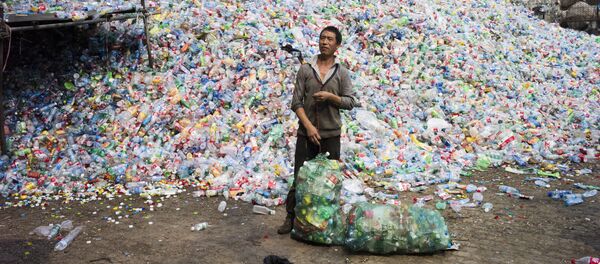Unilever, Renault, Google and Nike are some of the companies that have begun moving towards a circular business model.
It's not just businesses that are adopting these strategies, cities are also looking at how they can drastically cut waste.
London, Amsterdam and Paris are all looking at how they can shift from a circular economy, hoping to reuse products, parts and materials which produce no waste and pollution, and use fewer new resources and energy.
A report published by London's Waste and Recycling Board (LWRB) — a group aimed at cutting waste — has found that if the city made a shift and moved to a circular economy, this could have huge benefits for the capital.
Interesting development in #renewable household electricity generation #circulareconomy, https://t.co/9PPvZg4DH7
— Circular Economy (@circecon) 24 July 2017
"As London grows, it faces unprecedented pressures on its land and its resources. If we are to meet these challenges moving London to a circular economy will be vital," Shirley Rodrigues, London's deputy mayor for environment and energy, said.
"If London adopted a circular economy, the city would need less land and infrastructure to manage waste, freeing up space for housing and saving up to US$6.5 billion in infrastructure costs. This would generate 40,000 jobs and 12,500 of those would be new," Ms. Rodrigues said.
Ms. Rodrigues also said that "it is widely accepted that the circular economy has the potential to reduce" greenhouse gas emission as it uses less resources to make products in the first place, and releases less gases from the energy generation.
"This can be achieved through using resources more efficiently by extending the life of products and through the sharing of goods," Ms. Rodrigues added.
PricewaterhouseCoopers (PwC), who audit tax and consulting services, is also adopting a more circular method by offering advice about this to its clients.
The company uses cooking fat from its canteens to fuel its offices; it reuses old furniture and donates the rest to charity.
Helen Jackson, head of PwC's sustainability strategy believes there is huge savings to be made.
"There are big cost savings, there are reputational benefits from being responsible, and it is a topic which is of a lot of interest to our employees," Ms. Jackson said.
Interesting report on circular jobs in the Netherlands #circulareconomy
— Circular Economy (@circecon) 22 March 2017
https://t.co/N9TYqzzBz3
This new method is being adopted by others and according to industry experts these are just the early stages of things to come. The Ellen MacArthur Foundation, a registered charity with the stated aim of inspiring a generation to re-think and re-design, believes change is happening right now.
"We're still in the early stages, where you see some businesses, some cities, national governments playing around with these ideas and… starting to make moves towards a circular economy," said Ashima Sukhdev, head of governments and cities at the Ellen MacArthur Foundation.





